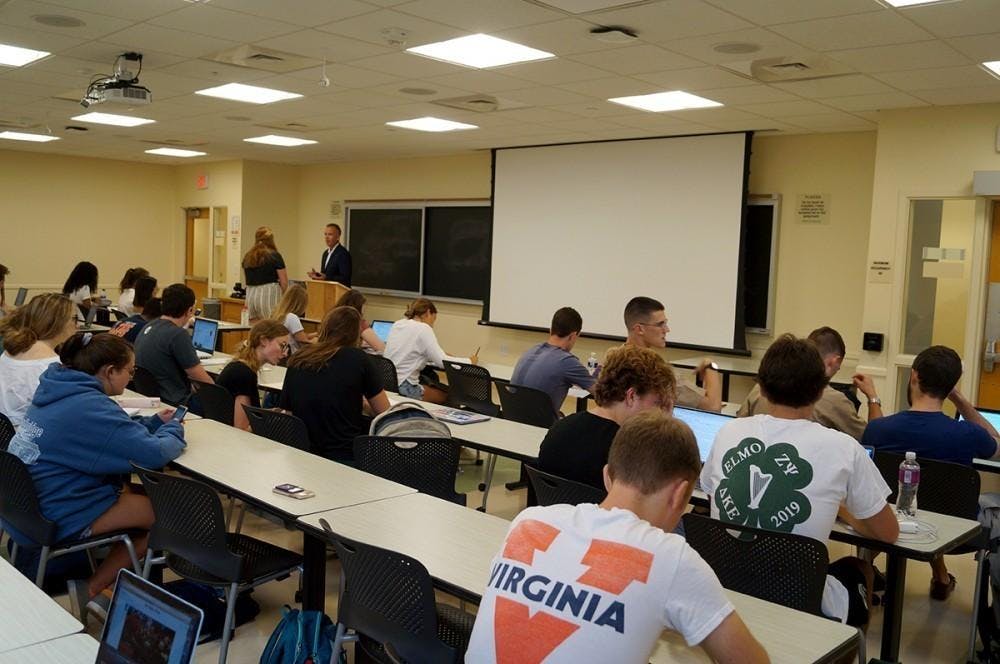The average American teen spends over seven hours on their phone daily. With this generation of “screenagers” entering college and adulthood, they are experiencing increasing difficulty working on tasks that require long periods of focus. At the college level, this results in students who do not have the capacity to read entire books or engage with complex material, leading them to look for short cuts like generative artificial intelligence that undermine the purpose of higher education. The University and students have a responsibility to counter these issues , namely attention deficits which encourage problematic short cuts, before they permanently take hold.
To understand the extent of attention deficit at the University and beyond, one must acknowledge the fact that Generation Z has grown up with constant access to visual material which is designed to hold the viewer's attention for a very short period of time. This includes TikTok videos, Instagram Reels and YouTube Shorts. This media prioritizes instant gratification over long-term focus.
The omnipresence of technology constantly tempts students to cave to distractions. If you walked into the Chemistry Building 402 lecture hall 50 years ago, you would see rows of students handwriting notes — now, you will most likely be met with a wall of screens. While technology has undeniably increased efficiency in the classroom, this rise in productivity can often come at the cost of students’ focus. Having access to messages, social media, games and more on the same devices used for notetaking provides the constant temptation of distraction, obstructing students' ability to be fully present and absorb information.
With these massive distractions, learning can be stunted, encouraging students to use shortcuts and tools to pass without fully challenging themselves. For example, if a student does not fully understand a concept in their lecture, they are far more likely to supplant that gap in understanding by using AI on their homework rather than attending office hours. When students use the internet to break down complicated concepts, summarize texts and generate ideas and work, it inhibits the objective of critical engagement with learning.
The use of resources like ChatGPT decreases the amount of brain activity used on assignments, ultimately defeating their purpose. The less students are able to focus on longer readings and assignments the more likely they are to use time-saving resources, trading cognitive development for a quick fix. It is difficult to imagine how the University can universally take on such a widespread and continuously evolving problem. Thus, part of the solution requires buy-in from the student perspective to prioritize their learning process.
Today, it is impossible to be fully removed from the distractions provided by screens, but younger generations at the University are not beyond hope. Instructors can encourage students to take a break from devices when possible, utilizing academic policy to pave a new way forward. A considerable number of professors at the University have instituted tech-free classes in recent years, with many students offering positive feedback. The University also piloted “tech sabbatical” courses that not only banned screens during class time, but also required students to commit to device-free time outside the classroom. Limiting distractions can help students be more present in their classes and get more out of them.
Even if professors do their best to assist students, there are always ways to evade these measures. In the end, it is up to the students to apply themselves. Students should try to use technology responsibly by tackling longer readings without the help of ChatGPT and limiting the possibility of distractions in class. They need to take up more individual responsibility in their education. By making a conscious effort to actively participate in the learning process, students are making an investment in their education and their future.
Beyond consequences in students' own academic and personal lives, the reduction in attention spans suggests ramifications for the entirety of society. Universities have the responsibility to shape the next generation of thinkers and problem solvers. These people require the ability to make reasoned judgements based on their own reflections, a skill that can only be built through extensive trial and practice — not by relying on AI. In a world of digital distractions and lowered cognitive endurance, students must take control of their education, and the University needs to provide them with the best opportunities to do so.
Carly Burstein is an opinion columnist who writes about politics for The Cavalier Daily. She can be reached at opinion@cavalierdaily.com.
The opinions expressed in this column are not necessarily those of The Cavalier Daily. Columns represent the views of the authors alone.







